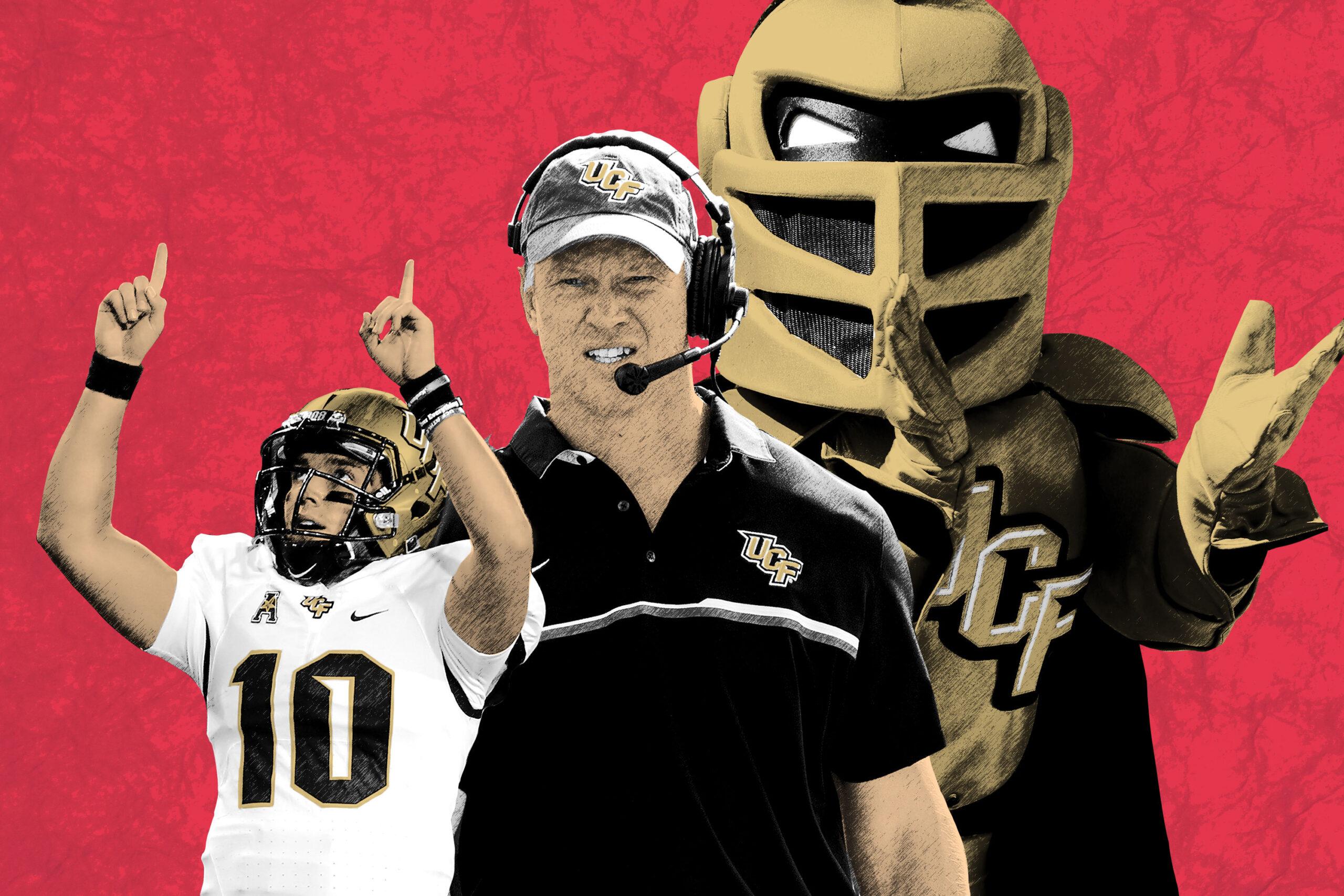Perfection Isn’t Enough for College Football’s Underclass
UCF is 11-0 and boasts the top scoring offense in the nation, yet it’s still miles away from playoff consideration. It begs the question: Will any Group of Five program ever be able to crack the four-team field?
If you charted UCF’s recent win totals, the result would look a lot like a George O’Leary lie detector test. The Knights have followed up one of the biggest collapses in college football history with one of its fastest rises. Normally, when a turnaround like that happens, you’d presume the highs weren’t that high, or the low wasn’t that low. But no: UCF was excellent in 2013, going 12-1, beating Big 12 champion Baylor in the Fiesta Bowl, and handing Teddy Bridgewater’s Louisville team its lone loss of the season. (To quote Jason from The Good Place: “BORTLES!”) And UCF was baaaaad in 2015, going 0-12 with 10 double-digit defeats along with a loss to Furman, which went 4-7 in the FCS.
This season, UCF is freakin’ awesome. The Knights boast the best offense in football under second-year head coach Scott Frost, averaging 48.3 points per game. They’re 11-0, and nine of their wins have come by double-digit margins. UCF wins its average game by 25.8 points; Michigan averaged 25.8 points per game this year. With a victory over Memphis in Saturday’s American Athletic Conference championship game, the Knights will have gone from 12-1 to 0-12 to 12-0 in a span of just five seasons.
But UCF isn’t a College Football Playoff candidate, because its conference schedule isn’t considered on par with those of teams in Power 5 leagues. In fact, the Knights aren’t even close to entering this season’s playoff picture. They’re 14th in the latest selection committee rankings, behind every two-loss power-conference team and one three-loss team. They’re a step below the programs that are a step below the bottom of the playoff race.
Nobody has seemed truly elite this year, and yet an undefeated UCF squad can hardly get a glance from the committee. Is it even possible for a team that’s not in a power conference to win a national championship in the playoff era?
We all remember Boise State’s win over Oklahoma in the 2007 Fiesta Bowl: the trick plays, the proposal, and, perhaps most significantly, the victory’s promise that college football’s Davids can topple its Goliaths. But that game wasn’t much of an outlier. When given the chance, teams from non–power conferences have routinely pulled their weight in showcase bowl games.
In the playoff system, the best team from the Group of Five (the catchall term for the non-ACC, Big Ten, Big 12, Pac-12, and SEC conferences in the FBS) gets a guaranteed slot in the New Year’s Six bowl rotation, and in three years those teams have gone 2-1. They fared well in the BCS era, too: Even though only power leagues were guaranteed slots in BCS bowl games, the non-power teams that fought their way onto that stage went 4-2 against power-conference opponents. (You can bump that record to 5-2 to include UCF’s aforementioned Fiesta Bowl win over Baylor, although the American was given an automatic BCS berth for that year only.)
While the playoff system is generally regarded as a massive improvement over the BCS, it’s worth noting that the BCS system, which equally balanced computer rankings and human polls, gave non-power-conference teams a fair shake. Utah, then in the Mountain West, was ranked sixth when it won the 2005 Fiesta Bowl and when it beat Alabama in the 2009 Sugar Bowl. TCU, also then in the Mountain West, was ranked third when it won the 2011 Rose Bowl. And despite the historical underdog narrative, Boise State (no. 8) was ranked higher than Oklahoma (no. 10) entering the 2007 Fiesta Bowl. The computers had no bias against teams from lower-profile leagues, because they ranked teams based on cold, emotionless algorithms.

Taking a peek at the six computer ratings systems used during the BCS era, we see that they would have loved UCF in 2017. The Colley Matrix has the Knights ranked third. The Anderson-Hester ratings have them second. The Wolfe ratings have them first. Taking both computers and human polls into account, UCF would be ranked eighth right now, with an opportunity to move even higher after championship weekend.
The human playoff selection committee, however, certainly seems to have a bias. In the four years of the playoff era, UCF’s current no. 14 ranking is the second-highest that a non-power-conference team has ever placed. The lone team to go higher was Memphis in 2015, and the Tigers made it to only no. 13, a ranking they held for a single week.
Perhaps the non-power-conference team with the best chance at playoff consideration was Houston in 2016. The Cougars had preseason buzz after earning the Group of Five’s New Year’s Six bowl slot the previous season, beating Florida State 38-24 in the Peach Bowl. And through a scheduling miracle, they faced two top-5 teams last fall, Oklahoma and Louisville. And they beat both! But Houston also dropped a few conference games, and the committee was lukewarm about it. After routing Louisville in November, the 9-2 Cougars were ranked 20th, below every two-loss power-conference team as well as five three-loss power-conference teams. When they lost a shootout to Memphis and fell to 9-3, they dropped to 24th in the rankings, below four four-loss power-conference teams.
That Houston team had the ideal formula for playoff contention: It came into the year with enormous national hype, it scheduled excellently, and it beat some of the best teams in the country. Even if those Cougars had gone undefeated, though, I still don’t think they would have made the playoff. I suspect they wouldn’t have been selected over one-loss Ohio State, which also had a head-to-head victory over Oklahoma, or one-loss Washington, which won the Pac-12. In the ideal Group of Five scenario, perfection still might not have been enough.
UCF has done everything within its power to merit playoff consideration in 2017. Its lone matchup against a power-conference team produced a dominant victory, 38-10 over Maryland. (For comparison: The score of Wisconsin’s win over that same Terrapins team was 38-13.) It has two wins over teams in the top 25 of the S&P+ ratings, Memphis and South Florida. Of the teams currently in the playoff chase, Alabama, Auburn, Clemson, Oklahoma, and Wisconsin also have two such wins, while Georgia, Miami, and Ohio State have one. Regardless of how you feel about the Knights’ playoff worthiness, there seems to be no good reason for placing them 14th, other than, of course, their name and conference affiliation.
The ACC, Big Ten, Big 12, Pac-12, and SEC are called the Power 5, and that’s fitting. They have the power on the committee, with a rule that one sitting athletic director from each league must be included in the selection process. They have all the power when it comes to scheduling, and little incentive to set up games against quality non-power-conference programs looking for marquee wins. They have the power to draw viewers, and the financial power that comes with it allows them to mold the very nature of the sport. Hell, they had the power to create the playoff in the first place.
The playoff was supposed to be the people’s championship, open to more teams than ever before, decided by even-handed humans talking everything out over a table. Watch this ad from 2014, the debut year of the playoff, in which a slew of fans from schools such as Hawaii, Tulane, Navy, Ohio, and East Carolina proclaim there are “no more computers to keep us out!” (If you look closely, you can see a man in a UCF hat.)
But it’s now become clear that access to the championship has actually thinned over time. Before the BCS, it was possible for then-independent programs like Miami and Pittsburgh to establish dynasties. During the BCS era, power conferences had a stranglehold on the system, but the computers could still vault a strong non-power-conference team into the top five if its résumé was good enough. But people—specifically, people with a vested financial interest in downplaying the abilities of non-power-conference teams—can now keep teams like UCF down and way out.
Non-power leagues have tried fighting this situation, but find themselves powerless. There was talk of creating a separate Group of Five playoff, but that was an easy bluff to call—the power conferences could have just cut them out of the New Year’s Six bowl rotation, seizing a major revenue stream. UCF’s league, the American Athletic Conference, has tried to shift the narrative by repeatedly labeling itself a member of the “Power Six.” The school has even run this ad that drops the word “power” four times in 30 seconds—Kanye West says it nine times in four minutes and 52 seconds on “Power”—and ends with the hashtag #AmericanPow6r. (Terrible hashtag.)
But the American can claim to be in the “Power Six” as much as I can claim to be the fifth Beatle, or the fourth Migo. Only the power leagues can decide if someone else joins the party, and it’s strongly in their favor to maintain the status quo. Calls to expand the list of power conferences are essentially calls to cut into those leagues’ profits on gigantic media rights deals. From the power conferences’ perspective, the Group of Five’s slot in the New Year’s Six is concession enough: They throw the little guys a bone to buy their participation in the system, and then they get to claim that the College Football Playoff is open to everybody.
And that, really, is what upsets me. The playoff embraces the concept that anybody can win—its website claims that “every FBS team has equal access to the College Football Playoff based on its performance,” and ESPN’s ad for this year’s playoff features a claymation Louisiana-Monroe fan with an airhorn proudly proclaiming that “all 130 teams!” have a shot. (For months, I thought this fan was cheering on a fictional school called the “Warthogs,” because ESPN didn’t bother to investigate what colors a Warhawks fan might wear.) It encourages the fans of the 60-plus non-power-conference teams to believe this sport is their sport, and plays into the stated desire to maintain a level playing field. But all of this intentionally belies the new reality endorsed by the selection committee: UCF and its Group of Five compatriots are part of college football’s permanent underclass. Even if they do everything right, there remains a limit to what they can achieve.